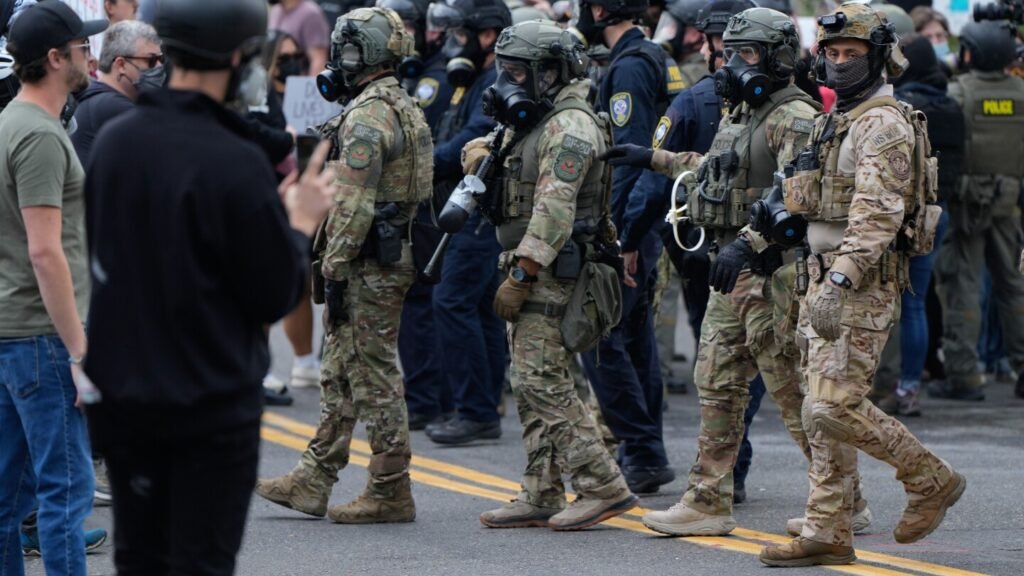Trump Deploys California National Guard to Oregon Amid Legal Battles
In a recent turn of events, President Donald Trump has initiated the deployment of the California National Guard to Oregon, following a federal judge’s temporary ruling that blocked the use of the Oregon National Guard in the ongoing protests in Portland. This decision ignited a swift response from both the governors of Oregon and California, who expressed their intent to contest the move legally.
Background of the Deployment
Approximately 200 members of the California National Guard, previously stationed in Los Angeles, are being reassigned to Portland. Oregon Governor Tina Kotek confirmed that about 100 troops arrived on Saturday, with another 100 on the way. Governor Kotek stated that there was no formal communication regarding this deployment from the federal government, raising concerns about the chain of command and legality of the action.
Both Kotek and California Governor Gavin Newsom have been vocal about their opposition to this deployment. Newsom’s office indicated that around 300 federalized California guard members might eventually be activated, potentially amplifying tensions between the states and the federal government.
Legal Implications and Upcoming Court Battles
Oregon’s Attorney General, Dan Rayfield, announced that both Oregon and California would seek to challenge this latest deployment in court. He emphasized the continuity of the legal battle, asserting, “What was unlawful yesterday is unlawful today.” The intent behind this legal challenge is to maintain the sovereignty of state governance and prevent what they view as an overreach of federal military power in American cities.
Rayfield articulated the sentiments of many state officials by stating, “Oregon will absolutely not be a party to the president’s attempt to normalize the use of the United States military in our American cities.” This position highlights the growing apprehension regarding federal executive power.
The Context of Oregon Protests
The backdrop to this deployment is a series of protests that have occurred outside the U.S. Immigration and Customs Enforcement (ICE) facility in Portland, which has been a focal point for demonstrations. The protests, characterized as relatively small-scale and largely localized, prompted U.S. District Judge Karin Immergut to block the deployment of the Oregon National Guard. She determined that the protests did not warrant federal military intervention.
Portland’s Mayor Keith Wilson described the situation as requiring thoughtful management rather than aggressive military presence. He noted instances of federal agents using excessive force during protests, reporting the indiscriminate use of pepper spray and impact munitions, which has raised significant concerns about the appropriateness of federal policing tactics.
Broader Implications of Military Deployments
President Trump has characterized cities like Portland and Chicago as troubled by crime and social unrest, which has led to the suggestion of military mobilization. Since his second term began, he has expressed intentions to send federal troops to as many as ten cities. The latest deployment to Chicago, where 300 National Guard troops were dispatched to protect federal properties, adds another layer to an escalating situation fraught with political implications.
Illinois Governor JB Pritzker voiced strong opposition to the military deployment in his state, asserting that the situation does not warrant such extreme measures, illustrating the growing dissent among state leaders regarding federal authority.
Conclusion: The Ongoing Struggle for Sovereignty
The ongoing situation in Oregon reflects larger national conversations about the relationship between state and federal powers, particularly regarding the use of military forces in civil contexts. As protests continue and tensions mount, the legal battles ahead will be pivotal in defining the limits of military intervention in American cities. With both Oregon and California poised to challenge the deployment in court, the outcome may set a significant precedent for how state sovereignty is respected and upheld in the face of federal authority.
Additional Reading:


